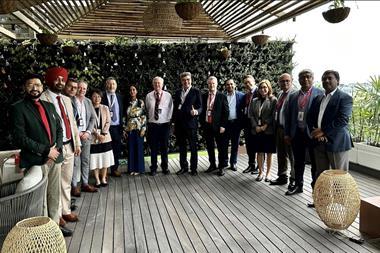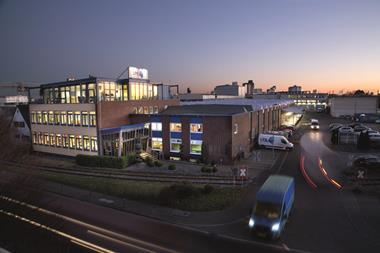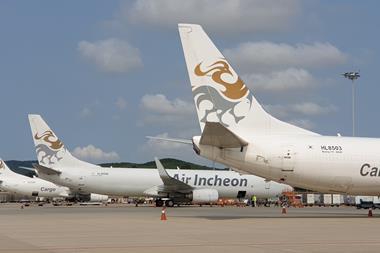Describing e-commerce as a “revolution”, Ken Allen, chief executive of DHL Express says that the Deutsche Post division is adapting its systems away from business-to-business (B2B), to adapt to this new consumer-driven environment.
“With this revolution that is going on at the moment in e-commerce, we’ve had more and more to adapt our systems away from business-to-business,” he said during the announcement of a €335m investment to double DHL Express’ Hong Kong Central Asia Hub.
This shift – to take better account of e-commerce consumer demands – is representative of the explosive growth of e-commerce around the globe and recognition by the world’s largest express company of where the future lies.
It is an interesting development, considering e-commerce traffic represents only 20% of the express giant’s total volumes.
More traditional premium express products still solidly drive the business, although Allen notes that some of its big customers operate on a direct model which obscures the actual volumes related to e-commerce.
Interestingly, Allen said that last year, in absolute terms – not percentage growth but absolute dollar increases – five out of DHL Express’ top 10 customers were e-commerce related, “so that is the phenomenon that is really going to grow rapidly”.
And perhaps more surprisingly, Allen admitted that he underestimated how e-commerce would grow: “A few years ago I didn’t really believe the international piece would grow, I always thought e-commerce would grow like crazy domestically, because it is so convenient.
“The international piece I thought maybe it is not going to be as fast growing because of the problems with returns and duties, etc.”
But that is not how it has shaped up he acknowledges, noting that the international, cross-border segment is growing faster than domestic e-commerce.
This is reflected in DHL Express’ own business, which is almost entirely international, where e-commerce is its fastest growing vertical.
“If you look at e-commerce versus life sciences, or engineering, or others, it is by far the fastest growing vertical,” Allen said, noting that it is growing at about 15% per year.
He added that e-commerce – at least at the moment – is not viewed as a separate product within the division, rather it is part of the premium products segment, with full track and trace.
And clearly it is not something to sniff at, as evidenced by Allen’s assertion that the world is “on the cusp of a second wave of global expansion” because of this nexus of technology and consumerism, the offspring of which is e-commerce.
“The growth we are seeing around the globe, but especially out of Asia has just been phenomenal over the last few years,” Allen said.
Technology has been key to this: “It is now possible, due to broadband and mobile technology, for every single person in the world to be connected and that’s going to drive a boom in e-commerce.
“Commerce now, for the first time in history, is going to be decided by the consumer,” Allen added, noting that e-commerce globally has been growing at around 25% a year.
With the Asia Pacific region expected to become the world’s largest cross-border e-commerce market by 2022, China will naturally generate the lion’s share of growth.
And because e-commerce consumers are far more fickle than ‘old-school’ consumers, DHL Express has been investing heavily in technology aimed at its consumer customers, a clear example of this and not so much a shift away from B2B, but an additional key focus on business to consumer (B2C) and consumer to consumer (C2C).
One thing is clear, this is not DHL Express dropping the ball on its mainstay business – its top 100 customers – the Phillips, Siemens, Samsung and Panasonics of the world, to name just a few – still drive the core business for the division and their business is growing.
“It is a bit of a golden era at the moment, because the normal B2B segment is growing. We have 100 customers we call them CSI – Customer Solutions Innovation – it is the top 100 customers and it is a very static group.
“I would say this is for the whole of Deutsche Post, not just Express – for the last 10 years this group of customers has grown by 2%-3% a year on average and right now they are growing 8%-9% per year,” he said.
Many of these companies suffered through the various downturns he notes, but those days are done and these companies are almost universally enjoying good growth now.
“World trade is far better than you’ll ever read about in the newspaper or see on TV, because I think people forget what we went through.
“In 2008/9 we had the Lehman crisis and all the restructuring that went on around that and then 2011/12 we had the euro crisis where Europe really had to restructure its whole economy and now a lot of the growth in the world is coming out of Europe.
“After that, you had the end of the China boom – China didn’t go negative or anything, but it finished building all its airports and all the cities and that is what caused the downturn in commodity prices. From about 2008/9 to about 2015 you had a really tough environment for commercial companies and now everyone’s going again.
“So the big B2B business is back at 8% growth and then e-commerce is the revolution – I just think it is so exciting what can happen there,” he said.
Clearly it is a good time to be in the express business as Allen noted that even a 4%-5% increase in volumes is equivalent to four full B747-400 freighters.
But that then brings up another interesting issue. With the rapid growth of e-commerce platforms like Amazon, or Alibaba, the logistics industry has been challenged to not just adapt to the model, but to cope with the sheer scale of the volumes they generate.
Carriers and freight forwarders alike have expressed their trepidation of what Alibaba’s moves into Southeast Asia might mean for their business.
While the prospect of more business from the world’s largest e-commerce company shines like a diamond, they also worry that with Alibaba will come SF Express – the air carrier logistics partner of the e-commerce giant – and potentially other Chinese logistics players into an already crowded landscape.
SF Express has indeed indicated its intent to expand regionally; it already has a basic foot-print across part of the region, and further afield and this seemingly could create a new competitor to the likes of DHL Express.
For Allen, who noted that SF Express already has a tie-up with UPS on the transpacific, it really depends on “how they are going to go international”.
He said: “If you look at the history of the express business, let’s go back 10-15 years when Japan was the second biggest economy in the world – Japanese express logistics companies never went international, really.
“You had OCS that went international to a limited extent, but the big ones like Yamato, or Sugawa, they’ve got a bit of international business, but they don’t really compete with the the big three integrators.
“I think for anyone to replicate what DHL, FedEx, or UPS has on an international basis is going to be extremely difficult and extremely costly,” he said.
He also noted that DHL Express works “very closely with Alibaba and they are converting the way the world does business”.
The fact that they, through SF Express and Amazon, for instance, are investing in their infrastructure is because nobody is prepared to make the step-up required to keep up with them, Allen said, adding: “We still do a lot of business with Amazon, but they are doing a lot of their own infrastructure because the established systems can’t keep up.”
“They are fabulous for us – Rakuten, Alibaba, Amazon – they’re really stimulating the global demand and therefore I really see it as a growth engine for the foreseeable future.
“I also think at some point the pricing that those guys charge will have to become more rational, especially Amazon – I mean the idea that delivery is free is just not a commercial, or economic reality.
“When they start to be more reflective on their pricing for the shipments that’s only got to be good news for us,” he said.
When asked for his views on US President Donald Trump’s rejection of the Transpacific Trade Partnership (TPP), Allen dismissed it as simple politicking.
“Internationalism and global trade is never going to stop, I mean tourism is a great example of international trade,” he offered, giving the example of how low-cost airlines have sprung up over the last 10 to 15 years, enabling vast numbers of people to travel the world.
“Spending your money in another country is a form of global trade,” he noted.
More directly, the rate of global economic expansion is going to continue to grow, Allen said, and this is going to be fuelled increasingly by e-commerce.
“Whether it is goods and services like we are moving, or just news and everything else, I think this is where the next big spurt in global trade is going to come from.
“Any entrepreneur in India can be online this time tomorrow morning selling his product and having an international audience.”
Read more Express news









